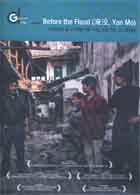
Before the Flood – Yan Mo 2005
Distributed by dGenerate Films, c/o Icarus Films, 32 Court St., 21st Floor, Brooklyn, NY 11201; 800-876-1710
Producer n/a
Directed by Li Yifan and Yan Yu
DVD , color, 147 min.
General Adult
China, Ecology, Engineering, Sociology, Environmental Activism
Date Entered: 12/09/2013
Reviewed by Andrew Jenks, California State University, Long BeachBefore the Flood is an epic tale that recounts a civilization transformed – often tragically and with little concern for the people affected -- by large-scale technological progress. China’s Three Gorges Dam, the largest in history, uprooted 1.4 million people along the Yangtze River – along with the traditions, communities, and economy that had sustained them for millennia. The filmmakers tell this story through the lens of an ancient walled city of Fengjie, immortalized in verse by the famous Chinese poet Li Bai. In the way of progress and designated for relocation because of its impending inundation, the city’s demolition, in microcosm, tells the story of those who livelihoods and community are decimated by the supposedly positive forward movement of industrial progress. The film captures the last months of the city – a kind of Pompeii moment, perhaps – that is slated to be wiped off the map by China’s breakneck program of modernization (the dam was completed ahead of schedule in 2008). Unlike Pompeii, however, there will be no volcanic ash to preserve at least hints of the world lost. This documentary serves as Fengjie’s volcanic ash crypt.
If the era of great dam building, and the cultural and ecological damage it caused, has passed in the United States (where some dams are even being dismantled to restore rivers to a previous state), it has only begun in China. Indeed, China’s twenty-first century desire to develop its economy at any cost provides a window into the same mentality that produced the great dam projects of the American West and along Russia’s great rivers. It is an attitude that justifies immense environmental and human sacrifice for the sake of a supposedly better and more modern future, powered by electricity. As with the people displaced in the twentieth-century mega-dam projects, China’s modernizers dismissed anyone opposed to their projects as Luddites and opponents of positive progress, thus putting the opponents of dams into the awkward position of being against a better future. Yet those opponents refused to be silenced, and this documentary captures their concerns and voices for posterity.
If there is a silver lining in such episodes in modern world history, it is often the connection between environmental activism and democracy. When people have fought to save their livelihoods and environment from various megaprojects of the future, they sometimes have gained an intense awareness of their powerlessness, and that often creates positive pressures on political and business structures to become more transparent and inclusive. But there is surprisingly little of this in the city of Fengjie. They certainly feel powerless. Residents grumble and complain; they fight for greater compensation. But they seem to have no sense that there is anything they can do to change the course of events.
My one criticism is that the film is long and roughly edited. But this seems justified by the impending destruction of the city – a complete chronicling of a city given a death sentence. One wonders what became of these people chronicled here. We see them at work and going about their daily business. They are not completely forlorn. The residents do receive relocation funds, but as with so much else in China the system for redistribution is rife with corruption. Many residents to their great chagrin discovered that their houses or businesses were not built legally – indeed, much of China’s business has a semi-legal character – and therefore did not qualify for relocation funds. Individuals and organizations had to find demolishers for their houses. The demolishers made money by selling the demolished material as scrap. To make matters worse, residents searching for new places in the areas where they planned to relocate faced exorbitant rents and prices driven by speculation, a housing shortage, and the general chaos created by the move. The result is ironic – that the people being moved can see no future for themselves because of a dam built to power China’s supposedly glorious future. The very system of compensation also raises a bigger issue: can there be compensation for what the dam has destroyed? To reduce the controversy to debates over proper levels of compensation is to support the very mentality that decided that certain ways of living are less valuable in monetary terms than others which seem to get in the way of economic growth and profit. Throughout the film residents spend most of their time bickering and haggling with each other over prices for scrap, new housing, and rumors about people who got more relocation money than they did. The communist party bosses locally remain the ultimate arbiters of these disputes, thus reinforcing the power of the system over which residents of the city seem to have little say.
Awards:
- Grand Prize Yamagata International Documentary Film Festival
- Winner Best Documentary Feature Lisbon International Documentary Film Festival
- Winner Wolfgang Staudte Prize Berlin Film Festival
- Winner Humanitarian Prize Hong Kong Film Festival
- Winner International Competition 2005 Cinema du Reel Film Festival